
|
|
Font Size:
|
||||
|
|
|
|
||||
STATISTICAL BRIEF #272:
National Health Care Expenses in the U.S. Civilian Noninstitutionalized Population, 2007
Highlights
- Overall, the mean and median expenses of persons with any expenses in 2007 (84.9 percent of the population) were $4,404 and $1,206, respectively.
- In 2007, hospital inpatient expenses and ambulatory care, including office-based visits and hospital outpatient care, each accounted for nearly one-third of total expenses for the U.S. civilian noninstitutionalized population, while prescribed medicines accounted for approximately one-fifth of total expenses.
- Hospital inpatient expenses comprised the largest single share of expenses for persons age 65 and over, while expenses for ambulatory care in office and hospital outpatient settings comprised the largest share for persons under age 65.
- In 2007, private insurance covered 42.4 percent of total expenses; individuals and family members paid 16.2 percent out of pocket, Medicare paid 24.8 percent, and Medicaid/CHIP paid 8.7 percent. While the proportions paid out of pocket did not differ markedly across age groups, shares paid by public and private insurance sources varied considerably by age.
- Mean expenses for persons age 65 and over with an expense ($9,696) were more than double the amount for persons under 65 ($3,499). Uninsured persons under 65 had the lowest mean expenses while persons 65 and over with Medicare and other supplemental public insurance had the highest mean expenses.
Introduction
This Statistical Brief presents estimates of health care expenses by type of service and distributions by payment sources for the U.S. civilian noninstitutionalized population in 2007. Health care expenses, as reported in this Brief, represent payments to hospitals, physicians, and other health care providers based on utilization information collected in the Medical Expenditure Panel Survey (MEPS) Household Component and payment data collected in both the MEPS Household and Medical Provider Components. Expense estimates include amounts paid by individuals, private insurance, Medicare, Medicaid and the Children's Health Insurance Program (CHIP), and other payment sources. All differences between estimates discussed in the text are statistically significant at the 0.05 level.
Findings
In 2007, there was an estimated total of $1.13 trillion paid for health care received by the U.S. civilian noninstitutionalized population distributed among various service categories including hospital inpatient and outpatient care, emergency room services, office-based medical provider services, dental services, home health care, prescription medicines, and other medical services and equipment (figure 1). Hospital inpatient expenses for both facility and separately billed physician services accounted for 31.3 percent of total expenses, and a similar share of expenses was attributable to the combination of ambulatory care provided in medical offices and hospital outpatient departments (23.5 and 8.5 percent, respectively). While prescribed medicines accounted for approximately one-fifth of health expenses (20.7 percent), other health service categories comprised relatively small percentages of the total, ranging from 2.0 percent for other medical services and equipment to 7.3 percent for dental services.
In 2007, 84.9 percent of the U.S. civilian noninstitutionalized population (about 255.7 million persons) had some expenses for hospital inpatient and outpatient care, emergency room services, office-based medical provider services, dental services, home health care, prescription medicines, and/or other medical services and equipment (figure 2).1 The proportion of people with expenses varied widely by type of service, with large proportions having expenses for office-based medical provider visits (71.0 percent) and prescribed medicines (61.7 percent), and much smaller proportions having expenses for hospital inpatient services (7.4 percent) and home health care (2.1 percent).
For persons with an expense for any type of health care service, the mean total expense per person in 2007 was $4,404 (figure 3). Among specific health care service categories, the mean expense per person with an expense ranged from highs of $15,754 for hospital inpatient services and $6,023 for home health care to lows of $643 for dental services and $408 for other medical services and equipment. Because a relatively small proportion of persons accounts for a large proportion of expenses, median expenses were substantially lower than mean expenses (figure 4). The overall median total expense for persons with expenses was $1,206, and ranged across service categories from highs of $8,606 for hospital inpatient services and $2,405 for home health care to lows of $225 for dental services and $210 for other medical services and equipment.
The distribution of expenses by type of service varied substantially by age (figure 5). Hospital inpatient expenses comprised 39.6 percent of expenses for persons age 65 and over compared to 28.4 percent for adults ages 18-64 and 21.4 percent for children under 18. Conversely, the share of expenses for ambulatory visits (office-based and hospital outpatient) was less for those 65 and older (24.9 percent) than for children under 18 years of age (32.0 percent) or adults 18-64 years of age (35.8 percent). Compared to adults, a substantially smaller share of total expenses for children under 18 were for prescribed medicines (12.3 percent versus over one-fifth of expenses for adults 18 and over). However, a substantially larger share of children's expenses were for dental services (18.3 percent) than for adults ages 18-64 (7.6 percent) or 65 and over (3.6 percent). Expenses for emergency room care comprised a fairly small share of total expenses in all age groups, ranging from 1.6 percent for those 65 and over to 5.6 percent for those under 18 years of age.
Health care expenses are largely paid by individuals and third-party payers, such as private insurance and public programs. In 2007, private insurance covered 42.4 percent of total expenses; individuals and family members paid 16.2 percent out of pocket, Medicare paid 24.8 percent, and Medicaid/CHIP paid 8.7 percent (figure 6). While the proportion paid out of pocket was slightly lower for persons age 65 and over (13.6 versus about 18 percent for the non-elderly), shares paid by public and private sources varied considerably. For example, private insurance paid for nearly half of expenses for children (44.6 percent) and over half of those for non-elderly adults (58.7 percent) but only 11.9 percent of expenses for the elderly age 65 and over. Conversely, Medicare paid for about two-thirds (65.0 percent) for persons age 65 and over versus only 6.6 percent for younger adults. Moreover, Medicaid/CHIP paid over one-quarter of expenses for children under 18 (28.4 percent), which was about three times the proportion for adults ages 18-64 (9.2 percent) and over 10 times that for persons age 65 and over (2.3 percent).
As shown in figure 7, average annual health care expenses varied substantially by age and type of health insurance coverage. People under 65 years of age with an expense had a mean total expense of $3,499 and a median total expense of $926, while those 65 years and older had a mean total expense of $9,696 and a median total expense of $4,447. Mean expenses for people under age 65 with any private insurance ($3,648) or public insurance only ($3,760) were nearly twice that for the uninsured ($2,057). Among persons age 65 and older with an expense, those with Medicare and other public insurance coverage had the highest mean expense ($13,186).
Data Source
The estimates in this Statistical Brief are based upon data from the MEPS HC-113: 2007 Full Year Consolidated Data File.
Definitions
Expenditures
Expenditures included the total direct payments from all sources to hospitals, physicians, other health care providers (including dental care), and pharmacies for services reported by respondents in the MEPS-HC. Expenditures for hospital-based services include those for both facility and separately billed physician services.
Sources of payment
- Out of pocket: This category includes expenses paid by the user or other family member.
- Private insurance: This category includes payments made by insurance plans covering hospital and medical care (excluding payments from Medicare, Medicaid, and other public sources). Payments from Medigap plans or TRICARE (Armed Forces-related coverage) are included. Payments from plans that provide coverage for a single service only, such as dental or vision coverage, are not included.
- Medicare: Medicare is a federally financed health insurance plan for the elderly, persons receiving Social Security disability payments, and persons with end-stage renal disease. Medicare Part A, which provides hospital insurance, is automatically given to those who are eligible for Social Security. Medicare Part B provides supplementary medical insurance that pays for medical expenses and can be purchased for a monthly premium.
- Medicaid/CHIP: Medicaid and CHIP are means-tested government programs jointly financed by federal and state funds that provide health care to those who are eligible. Medicaid is designed to provide health coverage to families and individuals who are unable to afford necessary medical care while CHIP provides coverage to additional low income children not eligible for Medicaid. Eligibility criteria for both programs vary significantly by state.
- Other sources: This category includes payments from the Department of Veterans Affairs (except TRICARE); other federal sources (Indian Health Service, military treatment facilities, and other care provided by the Federal Government); various state and local sources (community and neighborhood clinics, state and local health departments, and state programs other than Medicaid/CHIP); Workers' Compensation; various unclassified sources (e.g., automobile, homeowner's, or other liability insurance, and other miscellaneous or unknown sources); Medicaid/CHIP payments reported for persons who were not reported as enrolled in the Medicaid or CHIP programs at any time during the year; and private insurance payments reported for persons without any reported private health insurance coverage during the year.
Individuals under age 65 were classified in the following three insurance categories, based on household responses to health insurance status questions:
- Any private health insurance: Individuals who, at any time during the year, had insurance that provides coverage for hospital and physician care (other than Medicare, Medicaid/CHIP, or other public hospital/physician coverage) were classified as having private insurance. Coverage by TRICARE (Armed Forces-related coverage) was also included as private health insurance. Insurance that provides coverage for a single service only, such as dental or vision coverage, was not included.
- Public coverage only: Individuals were considered to have public coverage only if they met both of the following criteria: 1) they were not covered by private insurance at any time during the year, 2) they were covered by any of the following public programs at any point during the year: Medicare, Medicaid/CHIP, or other public hospital/physician coverage.
- Uninsured: The uninsured were defined as people not covered by private hospital/physician insurance, Medicare, TRICARE, Medicaid/CHIP, or other public hospital/physician programs at any time during the entire year or period of eligibility for the survey.
- Medicare and private insurance: This category includes persons classified as Medicare beneficiaries and covered by Medicare and a supplementary private policy.
- Medicare and other public insurance: This category includes persons classified as Medicare beneficiaries who met both of the following criteria: 1) They were not covered by private insurance at any point during the year, 2) They were covered by one of the following public programs at any point during the year: Medicaid, other public hospital/physician coverage.
- Medicare only: This category includes persons classified as Medicare beneficiaries but not classified as Medicare and private insurance or as Medicare and other public insurance. This group includes persons who were enrolled in Medicare HMOs and persons who had Medicare fee-for-service coverage only.
About MEPS-HC
MEPS-HC is a nationally representative longitudinal survey that collects detailed information on health care utilization and expenditures, health insurance, and health status, as well as a wide variety of social, demographic, and economic characteristics for the U.S. civilian noninstitutionalized population. It is cosponsored by the Agency for Healthcare Research and Quality and the National Center for Health Statistics.
For more information about MEPS, call the MEPS information coordinator at AHRQ (301) 427-1406 or visit the MEPS Web site at http://www.meps.ahrq.gov/.
References
Cohen, J. Design and Methods of the Medical Expenditure Panel Survey Household Component. MEPS Methodology Report No. 1. AHCPR Pub. No. 97-0026. Rockville, MD: Agency for Healthcare Policy and Research, 1997. http://www.meps.ahrq.gov/mepsweb/data_files/publications/mr1/mr1.shtml
Cohen, S. Sample Design of the 1996 Medical Expenditure Panel Survey Household Component. MEPS Methodology Report No. 2. AHCPR Pub. No. 97-0027. Rockville, MD: Agency for Health Care Policy and Research, 1997. http://www.meps.ahrq.gov/mepsweb/data_files/publications/mr2/mr2.shtml
Cohen, S. Design Strategies and Innovations in the Medical Expenditure Panel Survey. Medical Care, July 2003: 41(7) Supplement: III-5-III-12.
Ezzati-Rice, T.M., Rohde, F., Greenblatt, J., Sample Design of the Medical Expenditure Panel Survey Household Component, 1998-2007. Methodology Report No. 22. March 2008. Agency for Healthcare Research and Quality, Rockville, MD. http://www.meps.ahrq.gov/mepsweb/data_files/publications/mr22/mr22.shtml
Sing, M., Banthin, J., Selden, T., et al.: Reconciling Medical Expenditure Estimates from the MEPS and NHEA, 2002. Health Care Financing Review 28(1):25-40, Fall 2006. http://www.cms.hhs.gov/HealthCareFinancingReview/ (Accessed December 2009).
Suggested Citation
Kashihara, D. and Carper, K. National Health Care Expenses in the U.S. Civilian Noninstitutionalized Population, 2007. Statistical Brief #272. December 2009. Agency for Healthcare Research and Quality, Rockville, MD. http://www.meps.ahrq.gov/mepsweb/data_files/publications/st272/stat272.shtml
AHRQ welcomes questions and comments from readers of this publication who are interested in obtaining more information about access, cost, use, financing, and quality of health care in the United States. We also invite you to tell us how you are using this Statistical Brief and other MEPS data and tools and to share suggestions on how MEPS products might be enhanced to further meet your needs. Please e-mail us at mepspd@ahrq.gov or send a letter to the address below:
Steven B. Cohen, PhD, Director
Center for Financing, Access, and Cost Trends
Agency for Healthcare Research and Quality
540 Gaither Road
Rockville, MD 20850
1 Of the 15.1 percent of the population with no health care expenses, a very small proportion actually received health services for which no direct payments were made.
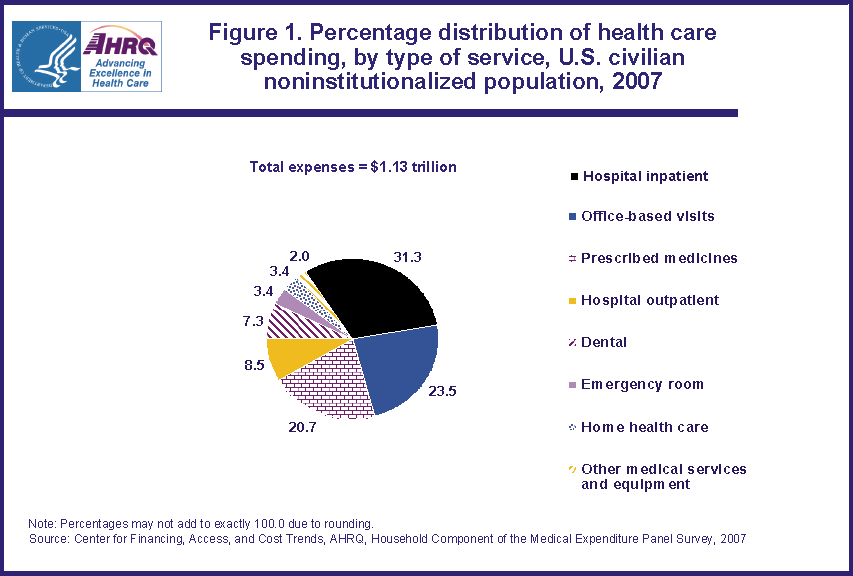 |
||||||||||||||||||||||||||||||
Note: Percentages may not add to exactly 100.0 due to rounding. |
||||||||||||||||||||||||||||||
|
|
||||||||||||||||||||||||||||||
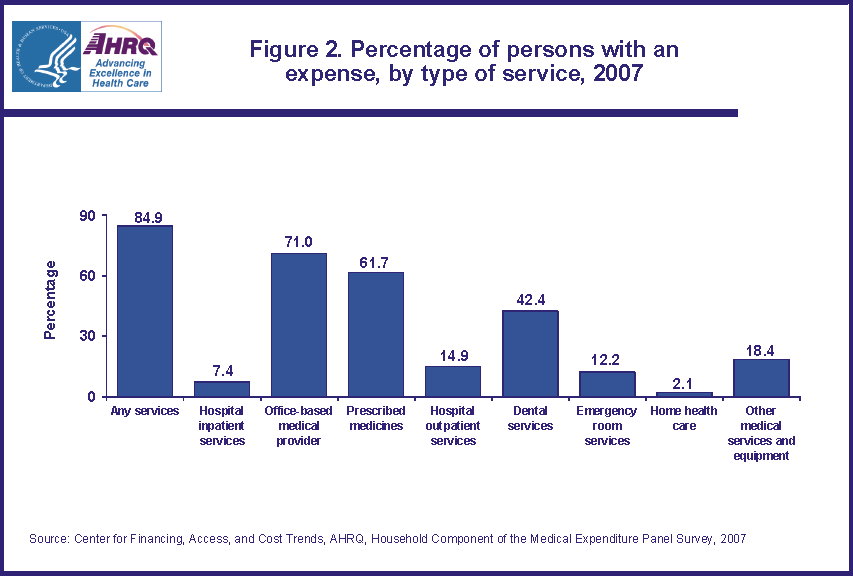 |
||||||||||||||||||||||||||||||
Source: Center for Financing, Access, and Cost Trends, AHRQ, Household Component of the Medical Expenditure Panel Survey, 2007 |
||||||||||||||||||||||||||||||
|
|
||||||||||||||||||||||||||||||
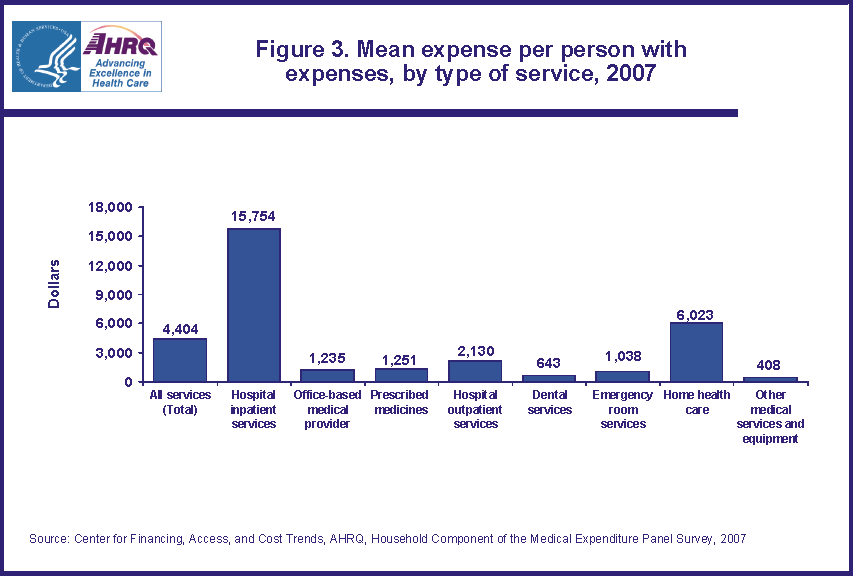 |
||||||||||||||||||||||||||||||
Source: Center for Financing, Access, and Cost Trends, AHRQ, Household Component of the Medical Expenditure Panel Survey, 2007 |
||||||||||||||||||||||||||||||
|
|
||||||||||||||||||||||||||||||
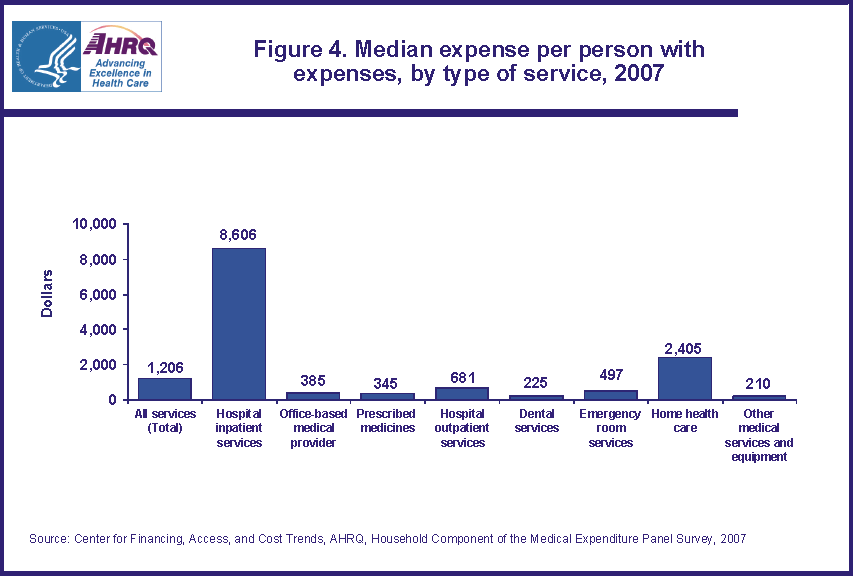 |
||||||||||||||||||||||||||||||
Source: Center for Financing, Access, and Cost Trends, AHRQ, Household Component of the Medical Expenditure Panel Survey, 2007 |
||||||||||||||||||||||||||||||
|
|
||||||||||||||||||||||||||||||
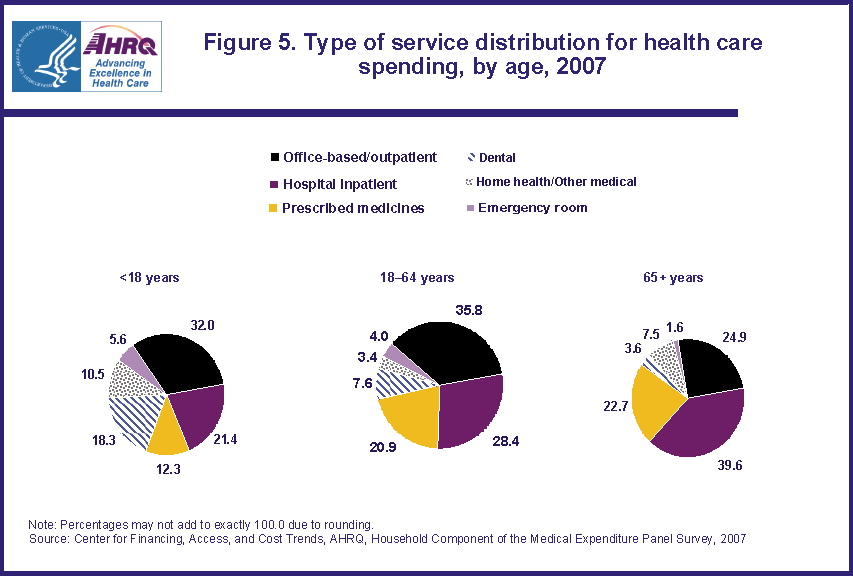 |
||||||||||||||||||||||||||||||
Note: Percentages may not add to exactly 100.0 due to rounding. |
||||||||||||||||||||||||||||||
|
|
||||||||||||||||||||||||||||||
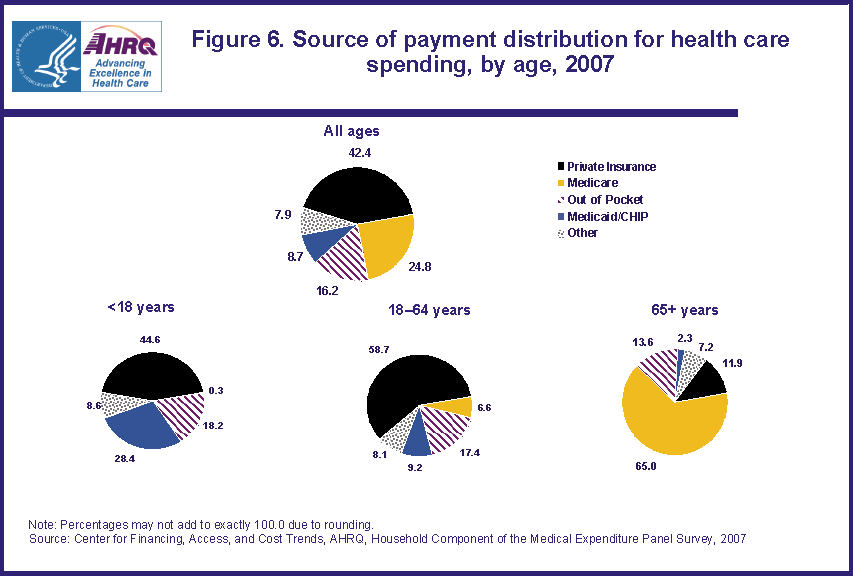 |
||||||||||||||||||||||||||||||
Note: Percentages may not add to exactly 100.0 due to rounding. |
||||||||||||||||||||||||||||||
|
|
||||||||||||||||||||||||||||||
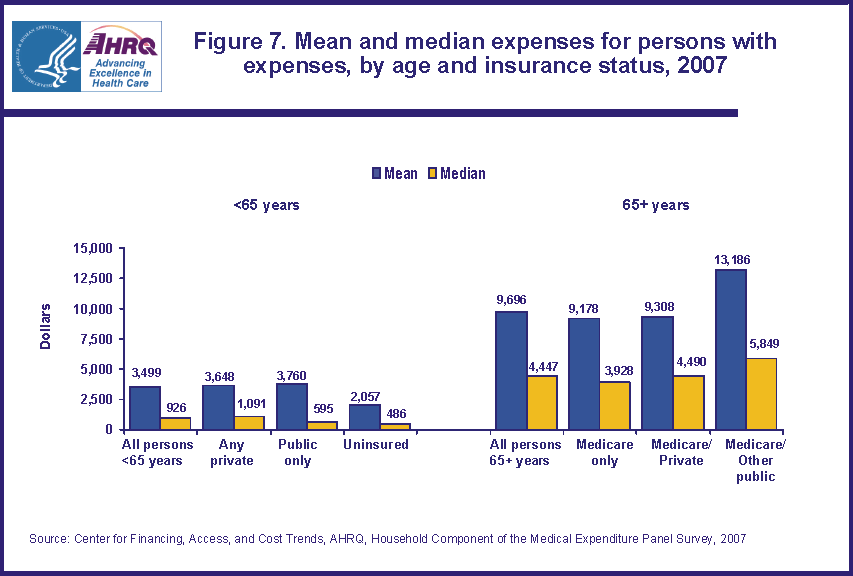 |
||||||||||||||||||||||||||||||
Source: Center for Financing, Access, and Cost Trends, AHRQ, Household Component of the Medical Expenditure Panel Survey, 2007
Source: Center for Financing, Access, and Cost Trends, AHRQ, Household Component of the Medical Expenditure Panel Survey, 2007 |
||||||||||||||||||||||||||||||
|
|


